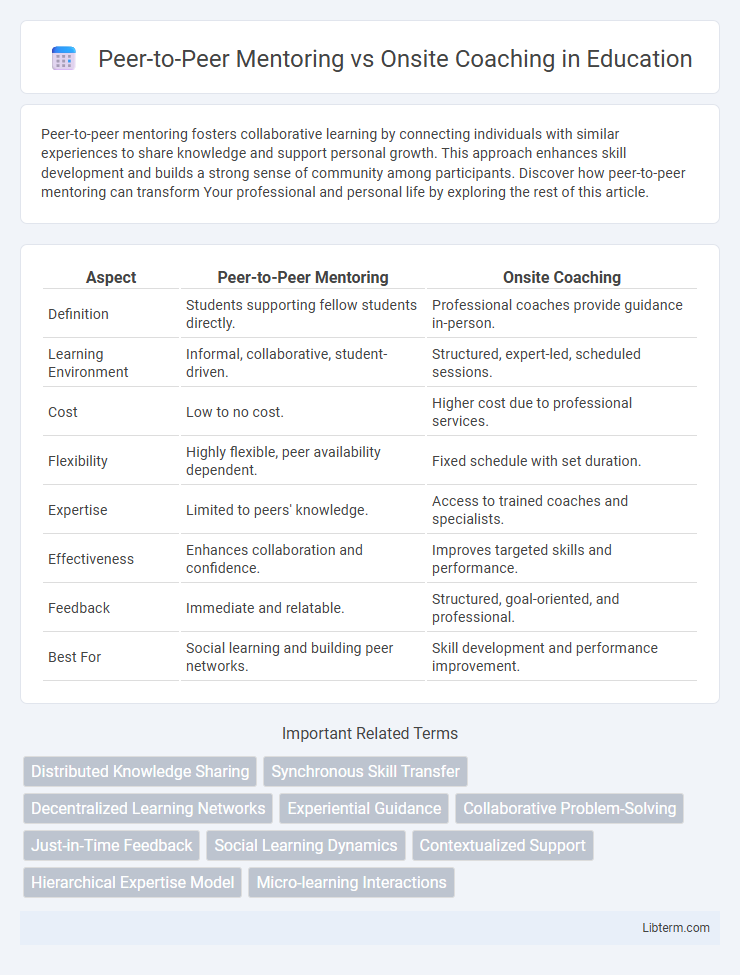Peer-to-peer mentoring fosters collaborative learning by connecting individuals with similar experiences to share knowledge and support personal growth. This approach enhances skill development and builds a strong sense of community among participants. Discover how peer-to-peer mentoring can transform Your professional and personal life by exploring the rest of this article.
Table of Comparison
| Aspect | Peer-to-Peer Mentoring | Onsite Coaching |
|---|---|---|
| Definition | Students supporting fellow students directly. | Professional coaches provide guidance in-person. |
| Learning Environment | Informal, collaborative, student-driven. | Structured, expert-led, scheduled sessions. |
| Cost | Low to no cost. | Higher cost due to professional services. |
| Flexibility | Highly flexible, peer availability dependent. | Fixed schedule with set duration. |
| Expertise | Limited to peers' knowledge. | Access to trained coaches and specialists. |
| Effectiveness | Enhances collaboration and confidence. | Improves targeted skills and performance. |
| Feedback | Immediate and relatable. | Structured, goal-oriented, and professional. |
| Best For | Social learning and building peer networks. | Skill development and performance improvement. |
Introduction to Peer-to-Peer Mentoring and Onsite Coaching
Peer-to-peer mentoring involves collaboration between colleagues of similar experience levels, fostering mutual learning and support in a flexible, informal setting. Onsite coaching delivers structured, expert guidance directly at the workplace, emphasizing real-time skill development and performance improvement. Both approaches enhance professional growth but differ in dynamics, with peer mentoring leveraging shared experiences and onsite coaching relying on specialized expertise.
Defining Peer-to-Peer Mentoring
Peer-to-peer mentoring involves individuals at similar experience levels exchanging knowledge and support without formal hierarchical roles, fostering collaborative learning and mutual growth. This approach emphasizes shared experiences and equal partnership, contrasting with onsite coaching, which typically involves an expert guiding a less experienced individual face-to-face. Peer-to-peer mentoring enhances engagement and problem-solving through relatable interactions, promoting continuous development in a flexible, less structured environment.
What is Onsite Coaching?
Onsite coaching refers to personalized, face-to-face guidance provided directly at the workplace or learning environment, enabling real-time feedback and hands-on skill development. This approach allows coaches to observe challenges firsthand, tailor interventions to specific contexts, and foster immediate behavioral change. Unlike peer-to-peer mentoring, onsite coaching often involves experts or trained professionals delivering structured support to enhance performance and efficiency.
Key Differences Between Peer-to-Peer Mentoring and Onsite Coaching
Peer-to-peer mentoring emphasizes collaborative learning among colleagues, fostering mutual support and shared experiences without formal hierarchy, while onsite coaching involves expert-led, structured guidance tailored to specific skill development in a professional setting. Peer mentoring typically relies on equal-level interactions and happens informally or through scheduled sessions, whereas onsite coaching requires a designated coach offering targeted feedback and performance improvement strategies onsite. The key differences lie in the roles, formality, and delivery methods, with peer mentoring promoting reciprocity and onsite coaching focusing on directive expertise.
Benefits of Peer-to-Peer Mentoring
Peer-to-peer mentoring fosters collaborative learning by leveraging shared experiences, which enhances trust and open communication between participants. It promotes cost-effective skill development and facilitates continuous feedback, leading to faster personal and professional growth. This approach also cultivates a supportive community and improves problem-solving skills through diverse perspectives.
Advantages of Onsite Coaching
Onsite coaching offers direct, real-time interaction that enhances personalized feedback and immediate skill adjustments, leading to more effective learning outcomes. It fosters stronger interpersonal connections through face-to-face communication, promoting a supportive learning environment that enhances motivation and accountability. Access to physical resources and hands-on practice during onsite sessions further accelerates skill acquisition compared to Peer-to-Peer Mentoring.
Challenges and Limitations of Each Approach
Peer-to-peer mentoring often faces challenges such as inconsistent guidance due to varied mentor expertise and potential lack of structured accountability, limiting its effectiveness in complex skill development. Onsite coaching encounters limitations including higher costs, logistical constraints, and limited scalability, which can reduce accessibility and flexibility for participants. Both approaches require careful alignment with organizational goals to overcome their respective drawbacks and maximize learning outcomes.
Ideal Scenarios for Peer-to-Peer Mentoring vs Onsite Coaching
Peer-to-peer mentoring excels in collaborative environments where employees benefit from shared experiences and mutual knowledge exchange, fostering continuous skill development and workplace relationships. Onsite coaching is ideal for situations requiring expert guidance on specialized tasks, immediate feedback, and hands-on training to address specific performance challenges or leadership development. Organizations aiming to balance scalability with personalized support often integrate both approaches to optimize employee growth and operational efficiency.
Choosing the Best Fit for Your Organization
Peer-to-peer mentoring fosters collaborative learning and knowledge sharing by connecting employees with similar roles or experiences, enhancing engagement and retention within the organization. Onsite coaching provides personalized, expert guidance tailored to individual or team needs, accelerating skill development and performance improvement directly within the work environment. Evaluating your organization's culture, learning objectives, and resource availability is essential to determine whether the interactive, ongoing support of peer-to-peer mentoring or the targeted, professional insight of onsite coaching will drive the most effective development outcomes.
Future Trends in Workplace Development Programs
Peer-to-peer mentoring is increasingly integrated with digital platforms, enabling personalized, scalable workplace development that leverages collective employee expertise. Onsite coaching evolves with hybrid models incorporating virtual tools to enhance accessibility and real-time feedback, aligning with growing remote workforce trends. Future workplace programs emphasize AI-driven analytics to tailor mentoring and coaching, driving continuous skill development and engagement across diverse work environments.
Peer-to-Peer Mentoring Infographic

 libterm.com
libterm.com